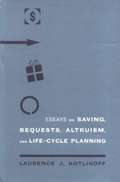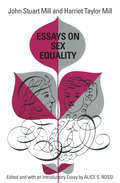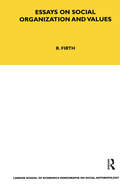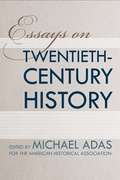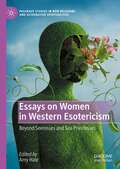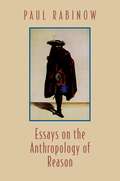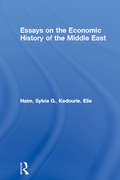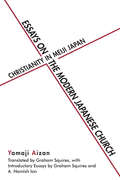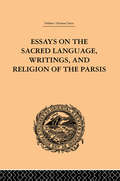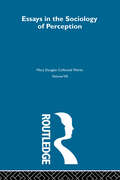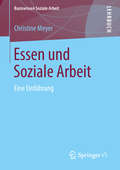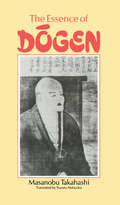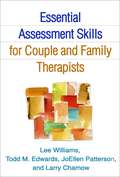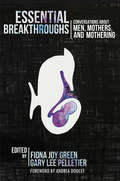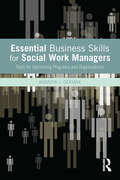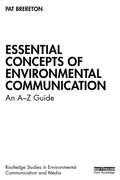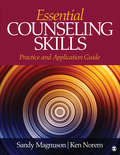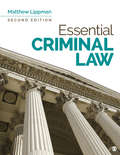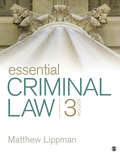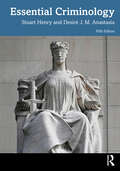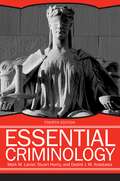- Table View
- List View
Essays on Saving, Bequests, Altruism and Life-cycle Planning
by Laurence J. KotlikoffThis collection of essays, coauthored with other distinguished economists, offers new perspectives on saving, intergenerational economic ties, retirement planning, and the distribution of wealth. The book links life-cycle microeconomic behavior to important macroeconomic outcomes, including the roughly 50 percent postwar decline in America's rate of saving and its increasing wealth inequality. The book traces these outcomes to the government's five-decade-long policy of transferring, in the form of annuities, ever larger sums from young savers to old spenders. The book presents new theoretical and empirical analyses of altruism that rule out the possibility that private intergenerational transfers have offset those by the government. While rational life-cycle behavior can explain broad economic outcomes, the book also shows that a significant minority of households fail to make coherent life-cycle saving and insurance decisions. These mistakes are compounded by reliance on conventional financial planning tools, which the book compares with Economic Security Planner (ESPlanner), a new life-cycle financial planning software program. The application of ESPlannerto U. S. data indicates that most Americans approaching retirement age are saving at much lower rates than they should be, given potential major cuts in Social Security benefits.
Essays on Sex Equality
by John Stuart Mill Alice S. Rossi Harriet Taylor MillThis volume brings together for the first time all the writings of John Stuart Mill and Harriet Taylor Mill on equality between the sexes, including John Stuart Mill's The Subjection of Women, a classic in the history of the women's rights movement since its publication one hundred years ago. Also contained in this volume is a major interpretative essay by Alice S. Rossi on Mill and Harriet Taylor which describes and analyzes their long personal and intellectual relationship.
Essays on Social Organisation and Values (London School Of Economics Monographs On Social Anthropology Ser. #No. 28)
by Raymond FirthIn this volume Professor Firth has brought together and commented upon a number of his papers on anthropological subjects published over the last thirty years. All these essays relate in different ways to his continuing interest in the study of social process, especially in the significance within a social context of individual choice and decision. Although some specialist studies are included, e.g. the group of papers dealing with the Polynesian island of Tikopia, the main themes of the book are broad ones and there are important general essays on such topics as social change; social structure and organization; modern society in relation to scientific and technological progress; and the study of values, mysticism, and religion by anthropologists. There is also a hitherto unpublished chapter on anthropology as a developing science.
Essays on Twentieth-Century History
by Michael AdasIn the sub-field of world history, there has been a surprising paucity of thinking and writing about how to approach and conceptualize the long twentieth century from the 1870s through the early 2000s. The historiographic essays collected inEssays on Twentieth Century Historywill go a long way to filling that lacuna. Each contribution covers a key theme and one or more critical sub-fields in twentieth century global history. Chapters address migration patterns, the impact of world wars, transformations in gender and urbanization, as well as environmental transitions. All are written by leading historians in each of the sub-fields represented, and each is intended to provide an introduction to the literature, key themes, and debates that have proliferated around the more recent historical experience of humanity. Essays on Twentieth Century Historyis an essential collection for scholars and students who wish to understand the recent past. Contributors include: Paul Edwards, Carl J. Guarneri, Gabrielle Hecht, Adam McKeown, John H. Morrow, Jr. , Jose C. Moya, Jean H. Quataert, Bonnie Smith, Howard Spodek, Robin Tucker, and the editor.
Essays on Women in Western Esotericism: Beyond Seeresses and Sea Priestesses (Palgrave Studies in New Religions and Alternative Spiritualities)
by Amy HaleThis book is the first collection to feature histories of women in Western Esotericism while also highlighting women’s scholarship. In addition to providing a critical examination of important and under researched figures in the history of Western Esotericism, these fifteen essays also contribute to current debates in the study of esotericism about the very nature of the field itself. The chapters are divided into four thematic sections that address current topics in the study of esotericism: race and othering, femininity, power and leadership and embodiment. This collection not only adds important voices to the story of Western Esotericism, it hopes to change the way the story is told.
Essays on the Anthropology of Reason
by Paul RabinowThis collection of essays explains and encourages new reflection on Paul Rabinow's pioneering project to anthropologize the West. His goal is to exoticize the Western constitution of reality, emphasize those domains most taken for granted as universal, and show how their claims to truth are linked to particular social practices, hence becoming effective social forces. He has recently begun to focus on the core of Western rationality, in particular the practices of molecular biology as they apply to our understanding of human nature. This book moves in new directions by posing questions about how scientific practice can be understood in terms of ethics as well as in terms of power. The topics include how French socialist urban planning in the 1930s engineered the transition from city planning to life planning; how the discursive and nondiscursive practices of the Human Genome Project and biotechnology have refigured life, labor, and language; and how a debate over patenting cell lines and over the dignity of life required secular courts to invoke medieval notions of the sacred. Building on an ethnographic study of the invention of the polymerase chain reaction--which enables the rapid production of specific sequences of DNA in millions of copies Rabinow, in the final essay, reflects in dialogue with biochemist Tom White on the place of science in modernity, on science as a vocation, and on the differences between the human and natural sciences.
Essays on the Anthropology of Reason (Princeton Studies in Culture/Power/History)
by Paul RabinowThis collection of essays explains and encourages new reflection on Paul Rabinow's pioneering project to anthropologize the West. His goal is to exoticize the Western constitution of reality, emphasize those domains most taken for granted as universal, and show how their claims to truth are linked to particular social practices, hence becoming effective social forces. He has recently begun to focus on the core of Western rationality, in particular the practices of molecular biology as they apply to our understanding of human nature. This book moves in new directions by posing questions about how scientific practice can be understood in terms of ethics as well as in terms of power.The topics include how French socialist urban planning in the 1930s engineered the transition from city planning to life planning; how the discursive and nondiscursive practices of the Human Genome Project and biotechnology have refigured life, labor, and language; and how a debate over patenting cell lines and over the dignity of life required secular courts to invoke medieval notions of the sacred. Building on an ethnographic study of the invention of the polymerase chain reaction--which enables the rapid production of specific sequences of DNA in millions of copies Rabinow, in the final essay, reflects in dialogue with biochemist Tom White on the place of science in modernity, on science as a vocation, and on the differences between the human and natural sciences.
Essays on the Economic History of the Middle East
by Elie Kedourie Sylvia G. HaimPublished in 1988, Essays on the Economic History of the Middle East is a valuable contribution to the field of Middle Eastern Studies.
Essays on the Modern Japanese Church: Christianity in Meiji Japan (Michigan Monograph Series in Japanese Studies #27)
by Aizan YamajiEssays on the Modern Japanese Church (Gendai Nihon kyokai shiron), published in 1906, was the first Japanese-language history of Christianity in Meiji Japan. Yamaji Aizan’s firsthand account describes the reintroduction of Christianity to Japan—its development, rapid expansion, and decline—and its place in the social, political, and intellectual life of the Meiji period. Yamaji’s overall argument is that Christianity played a crucial role in shaping the growth and development of modern Japan. Yamaji was a strong opponent of the government-sponsored “emperor-system ideology,” and through his historical writing he tried to show how Japan had a tradition of tolerance and openness at a time when government-sponsored intellectuals were arguing for greater conformity and submissiveness to the state on the basis of Japanese “national character.” Essays is important not only in terms of religious history but also because it highlights broad trends in the history of Meiji Japan. Introductory chapters explore the significance of the work in terms of the life and thought of its author and its influence on subsequent interpretations of Meiji Christianity.
Essays on the Sacred Language, Writings, and Religion of the Parsis (Trubner's Oriental Ser.)
by Martin HaugThe author_s principal objective in publishing these essays was to present all the materials for impartial judgment of the scriptures and religion of the Parsis. Contents: Essay I. History of the Researches into the Sacred Writings and Religion of the Parsis; Essay II. Languages of the Parsi Scriptures; Essay III. The Zend-Avesta, or the Scripture of the Parsis; and Essay IV. The Zoroastrian Religion as to its Origin and Development. A biographical memoir of Dr. Haug by Professor E.P. Evans is also included in this volume.
Essays on the Sociology of Perception
by Mary DouglasFirst published in 1982, this is one of Mary Douglas' favourite books. It is based on her meetings with friends in which they attempt to apply the grip/group analysis from Natural Symbols. The essays have been important texts for preparing grid/group exercises ever since. She is still trying to improve the argument of Natural Symbols and is always hoping to find better applications to illustrate the power of the two dimensions used for accurate comparison.
Essen und Soziale Arbeit: Eine Einführung (Basiswissen Soziale Arbeit Ser. #8)
by Christine MeyerDas Lehrbuch bietet einen Einstieg in Fragen des Essens, die in allen Handlungsfeldern Sozialer Arbeit täglich wiederkehrend von Bedeutung sind. Mit jeder angebotenen Mahlzeit in sozialpädagogischen Institutionen entstehen besondere soziale Situationen, in denen soziale Gruppen Zugehörigkeit erfahren können. Die Einführung liefert erstmals einen Überblick aus sozialpädagogischer Perspektive auf das komplexe Thema und dazugehörigen Aspekten, wie z.B. Ernährungsweisen, Esskulturen, Ernährungserziehung.
Essence Of Dogen
by TakahashiFirst published in 1983. Routledge is an imprint of Taylor & Francis, an informa company.
Essential Assessment Skills for Couple and Family Therapists
by Lee Williams Todd EdwardsShowing how to weave assessment into all phases of therapy, this indispensable text and practitioner guide is reader friendly, straightforward, and practical. Specific strategies are provided for evaluating a wide range of clinical issues and concerns in adults, children and adolescents, families, and couples. The authors demonstrate ways to use interviewing and other techniques to understand both individual and relationship functioning, develop sound treatment plans, and monitor progress. Handy mnemonics help beginning family therapists remember what to include in assessments, and numerous case examples illustrate what the assessment principles look like in action with diverse clients.
Essential Breakthroughs: Conversations About Men, Mothers And Mothering
by Fionna Joy GreenEssential Breakthroughs: Conversations About Men, Mothers, and Mothering thinks from the nexus of gender, essentialism, and care. The authors creatively blend the philosophical and the personal to collectively argue that while gender is essential to our social and theoretical definitions of care, it is dangerously co-opted into naturalized discourses, which limit particular identities and negate certain forms of care. The perspectives curated in Essential Breakthroughs illuminate how care, as a respected and productive cultural ethic, is neither inherent nor instinctual for any human, but is learned and fostered. The chapters are informed by feminist, queer, and trans politics, wielding post-structuralist methodologies of unlearning and deconstruction, while maintaining the maternal lens as a credible feminist analytical tool and not as a gender-essentialist practice.
Essential Business Skills for Social Work Managers: Tools for Optimizing Programs and Organizations
by Andrew J. GermakMany social workers find themselves in management positions within a few years of graduating from MSW programs. Most of these jobs are in nonprofit human service organizations in which, increasingly, business acumen is necessary to maintain grants and donations, start new programs, market services to clients, supervise the finance function, and understand the external environment. This book teaches MSW students and early-stage social work management practitioners the essential business skills needed to manage programs and organizations; to improve their overall management toolkit for finding a better job or getting promoted; and, ultimately, to gain parity with other managers holding MBA degrees and working in the human service space. This text can serve as a desk reference for managers to troubleshoot various situations. It is also appropriate for social work macro practice courses at the undergraduate and graduate levels, as well as courses that cover human resource management and financial management.?
Essential Concepts of Environmental Communication: An A–Z Guide (Routledge Studies in Environmental Communication and Media)
by Pat BreretonThis book draws on a broad spectrum of environmental communications and related cross-disciplinary literature to help students and scholars grasp the interconnecting key concepts within this ever-expanding field of study. Aligning climate change and environmental learning through media and communications, particularly taking into account the post-COVID challenge of sustainability, remains one of the most important concerns within environmental communications. Addressing this challenge, Essential Concepts for Environmental Communication synthesises summary writings from a broad range of environmental theorists, while teasing out provocative concepts and key ideas that frame this evolving, multi-disciplinary field. Each entry maps out an important concept or environmental idea and illustrates how it relates more broadly across the growing field of environmental communication debates. Included in this volume is a full section dedicated to exploring what environmental communication might look like in a post-COVID setting: • Offers cutting-edge analysis of the current state of environmental communications. • Presents an up-to-date exploration of environmental and sustainable development models at a local and global level. • Provides an in-depth exploration of key concepts across the ever-expanding environmental communications field. • Examines the interaction between environmental and media communications at all levels. • Provides a critical review of contemporary environmental communications literature and scholarship. With key bibliographical references and further reading included alongside the entries, this innovative and accessible volume will be of great interest to students, scholars and practitioners alike.
Essential Counseling Skills: Practice and Application Guide
by Sandy Magnuson Ken NoremEssential Counseling Skills: Practice and Application Guide offers practical, step-by-step guidance for developing and applying the skills necessary for careers in counseling. Using the metaphor of a professional journey, this guide provides commentary and background information throughout, as readers are directed in their development of such key counseling skills as empathy, building relationships, case conceptualization, and facilitating change. Deep reflection is further encouraged at every key stage through the integration of theory with a wealth of applied exercises and examples.
Essential Criminal Law
by Matthew LippmanEssential Criminal Law, Second Edition equips students with a foundational and practical understanding of criminal law in the United States, as well as encourages strong legal reasoning skills for students with no prior exposure to case law. Award-winning professor and bestselling author Matthew Lippman guides students through the complexities of the legal system using thought-provoking examples of real-life crimes and legal defenses, along with highly approachable case analyses. Updated with the most current developments in criminal law and public policy, the Second Edition takes students beyond the classroom and prepares them to apply criminal law in today’s legal world.
Essential Criminal Law
by Matthew LippmanEssential Criminal Law, Second Edition equips students with a foundational and practical understanding of criminal law in the United States, as well as encourages strong legal reasoning skills for students with no prior exposure to case law. Award-winning professor and bestselling author Matthew Lippman guides students through the complexities of the legal system using thought-provoking examples of real-life crimes and legal defenses, along with highly approachable case analyses. Updated with the most current developments in criminal law and public policy, the Second Edition takes students beyond the classroom and prepares them to apply criminal law in today’s legal world.
Essential Criminal Law
by Matthew LippmanEssential Criminal Law provides a highly accessible introduction to U.S. criminal law that helps students, including those with no prior exposure to case law, build their legal reasoning skills. Drawing from more than 30 years of teaching experience, best-selling author Matthew Lippman guides readers through the complexities of the legal system using thought-provoking examples of real-life crimes and legal defenses, along with approachable case analyses. The Third Edition keep readers up to date with coverage of timely topics and the most current developments in criminal law and public policy.
Essential Criminal Law
by Matthew LippmanEssential Criminal Law provides a highly accessible introduction to U.S. criminal law that helps students, including those with no prior exposure to case law, build their legal reasoning skills. Drawing from more than 30 years of teaching experience, best-selling author Matthew Lippman guides readers through the complexities of the legal system using thought-provoking examples of real-life crimes and legal defenses, along with approachable case analyses. The Third Edition keep readers up to date with coverage of timely topics and the most current developments in criminal law and public policy.
Essential Criminology
by Stuart Henry Desiré J. AnastasiaThis significantly expanded edition of Essential Criminology covers the broadest range of criminological theories—the essential criminological theories—from longstanding ones such as classical theory and strain theory to recently introduced ones such as ultra-realism and green cultural criminology. Whether all are “essential” depends on one’s theoretical stance. The value of this text is its carefully designed comparative analysis, which helps readers consider their relative contribution to the field. Originally designed as an alternative to lengthy and expensive introductory texts, Essential Criminology provides a concise, yet comprehensive overview of the field. The book offers a clear, structured, student-friendly, critical analytical examination of the nature of crime, theories of crime causation, and their criminal justice policy implications. Causal theories covered range from micro-level classical and rational choice to biological psychological, social learning, social control, and interactionist perspectives, to macro-level social ecology, anomie/strain, conflict, Marxist, feminist, and postmodernist theories. Over its 26-year history the book has added new theoretical perspectives as these have gained prominence. New to this edition are chapters on critical and ultra-realism, and critical green criminology and discussions of zemiology, critical race theory, and quantum holographic criminology. The authors have also expanded some theoretical frameworks that had previously been underdeveloped such as opportunity theory, subcultural theory, and social constructionism.Essential Criminology contextualizes criminology in the globally interdependent 21st century, addressing the crimes of terrorism, global pandemics, and climate change. With its cutting-edge updates, illustrative real-world examples, and student-friendly study tools, including analytically comparable summary charts exposing each theory's ontological assumptions, this text was designed primarily for undergraduate criminology courses, but has also been adopted by community colleges and graduate programs in criminology, sociology, and political science.
Essential Criminology
by Mark M. Lanier Stuart Henry Desiré J. M. AnastasiaIn the fourth edition of Essential Criminology, authors Mark M. Lanier, Stuart Henry, and Desiré J. M. Anastasia build upon this best-selling critical review of criminology, which has become essential reading for students of criminology in the 21st century. Designed as an alternative to overly comprehensive, lengthy, and expensive introductory texts, Essential Criminology is, as its title implies, a concise overview of the field. The book guides students through the various definitions of crime and the different ways crime is measured. It then covers the major theories of crime, from individual-level, classical, and rational choice to biological, psychological, social learning, social control, and interactionist perspectives. In this latest edition, the authors explore the kind of criminology that is needed for the globally interdependent twenty-first century. With cutting-edge updates, illustrative real-world examples, and new study tools for students, this text is a necessity for both undergraduate and graduate courses in criminology.
